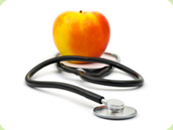 |
MYTH: Soy decreases sperm count
FACT: "There are no human data that show that consuming soy causes abnormal testosterone or estrogen levels. Other human trials found that men consuming 40-70 mg/day of soy isoflavones from soy foods or soy supplements have shown no significant changes in testosterone levels compared to control groups or baseline levels." [theFactsAboutSoy.com] |
MYTH: Soy has feminizing effect on men
FACT: In the review Soybean isoflavone exposure does not have feminizing effects on men: a critical examination of the clinical evidence, which appeared in Fertility and Sterility, Messina examined 150 clinical studies and concluded that soy goods had absolutely no feminizing effect on men.
Research also shows that soy protein actually boosts muscle growth as effectively as whey does. One study reported that bodybuilders taking soy protein twice a day for 12 weeks gained an equivalent amount of muscle mass as those taking whey protein twice a day. A 2004 Ohio state University study found that trained men consuming 33 g of soy or whey for 9 weeks increased muscle mass similarly.
MYTH: Eating a typical western diet but with lots of fruits and vegetables added will have same effect on cancer risk as eating a plant-based diet
FACT:
When it comes to cancer risk particularly, one cannot eat a modern western diet, add in a few fruits and veggies, and expect the same results as if one were eating a plant-based diet. Those few fruits and veggies, though they will help if eaten in large quantities, are not enough to make up for the rest of the daily menu when it comes to cancer. The only way to drop cancer risks dramatically is to stop ingesting animal products. [Fruit and vegetable intake and overall cancer risk in the European Prospective Investigation into Cancer and Nutrition (EPIC)] And the same goes for heart disease; there just isn’t a way to negate all the artery-clogging animal fat coming into the body. However, every reduction of animal products will help reduce your risk; so if you find that eliminating all meat, dairy and eggs is too difficult, then simply minimize such intake as much as you can.
MYTH: Organic (vs. conventional) cow's milk is healthy
FACT: Growth hormones are innately present in all milk (whether organic or not) for the purpose of growing a calf into a cow as quickly as possible. These growth hormones are suspected as the root cause of most acne [Diet and acne: a review of the evidence], breast and prostatic cancers.[Milk consumption: aggravating factor of acne and promoter of chronic diseases of Western societies]
MYTH: It's hard to consume adequate protein on a vegan diet
FACT: "It is very easy for a vegan diet to meet the recommendations for protein, as long as calorie intake is adequate." For the full article with detailed examples, explanation and citations, please see Protein in the Vegan Diet, by Reed Mangels, PhD, RD.
MYTH: Vegan diets are not appropriate for pregnant women nor infants
FACT: Even the American Dietetic Association realizes this isn't true: "It is the position of the American Dietetic
Association that appropriately
planned vegetarian diets, including
total vegetarian or vegan diets, are
healthful, nutritionally adequate, and
may provide health benefits in the
prevention and treatment of certain
diseases. Well-planned vegetarian diets
are appropriate for individuals
during all stages of the life cycle, including
pregnancy, lactation, infancy,
childhood, and adolescence, and for
athletes." For details on feeding vegan infants and young children, see Feeding Vegan Kids, Tips for Feeding Children and Tips for Parents of Young Vegans, and for details on a vegan diet during pregnancy see Vegan Nutrition During Pregnancy and Childhood. |
 |
For more myths and frequently asked questions, please visit The Vegetarian Resource Group's FAQ page.
|




